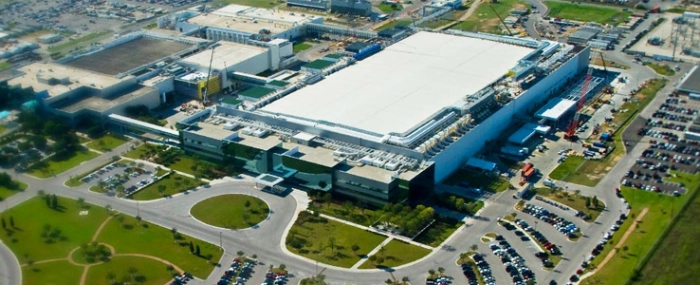
© samsung
Analysis |
Texas winter to impair global 12-Inch wafer foundry capacity
As previously reporder by Evertiq, Samsung's Austin-based foundry Line S2 partially suspended operation on Tuesday, February 16 due to the winter storm affecting Texas. A move which is expected to impair 1-2% of the global 12-inch wafer foundry capacity, according to TrendForce
The partial shutdown of the plant, and other semiconductor plants in the city, was not accidental but planned in advanced in a move to relieve the power grid from unnecessary stress during the winter storm. The city’s public utility company, Austin Energy was able to warn of an impending power blackout ahead of time, making it possible for companies to plan ahead, at least somewhat.
TrendForce’s data show that the monthly 12-inch capacity of Line S2 accounts for nearly 5% of the global total. While the winter storm is estimated to impair about 1-2% of the global 12-inch wafer foundry capacity, the actual duration of the impact will still depend on the region’s temperature. Assuming that Austin will gradually warm up on Friday, February 19, and a phased restoration of power will take place at the fab, TrendForce now expects Line S2 to return to full operation after at least one week.
TrendForce indicates that the main process technologies of the fab are the 14nm and 11nm nodes. These technologies are mainly used to manufacture Qualcomm’s 5G RFICs. The fab’s other production capacity is distributed among production lines that feature nodes ranging from 65nm to 28nm and mainly manufacture products under Samsung System LSI. Additionally, the fab manufactures automotive chips for Tesla and Renesas. Although Samsung had implemented corresponding measures in advance of the blackout, with no silicon wafers reported to be damaged and a mere slight extension in lead times for certain products, Line S2’s increased lead times are still expected to exacerbate the strained semiconductor market in light of the industry’s shortage of production capacities for various semiconductor applications, including automotive products, which remain in extremely high demand.
Despite the blackout’s limited impact on NAND Flash controller manufacturing, urgent orders from SSD purchasers may result in a potential price hike
It should be pointed out that, although Line S2 has stopped manufacturing NAND Flash, Samsung LSI still manufactures 14-40nm NAND Flash/SSD controllers at the fab. Given that the volume of wafer starts for controllers at Line S2 is relatively low, and Samsung had already made emergency response preparations ahead of time, the blackout is expected to result in only a slight extension of lead times, without significant impact on the overall controller output. However, as PC OEMs and CSPs are now starting to negotiate for the procurement of SSDs, major SSD suppliers have taken the strained supply of controller ICs into account when quoting SSD prices. As such, despite the blackout’s relatively low impact on NAND Flash/SSD controller manufacturing, SSD purchasers, including the aforementioned PC OEMs and CSPs, may potentially accept a price hike during the negotiation process due to their urgency in procuring additional SSDs.
With regards to 2Q21 prices, TrendForce is currently adhering to the previous forecast of “mostly flat” for client SSDs and “slight decline” for enterprise SSDs, but TrendForce does not rule out the possibility that overall SSD prices may move in a positive trajectory once some purchasers accept a price hike.


